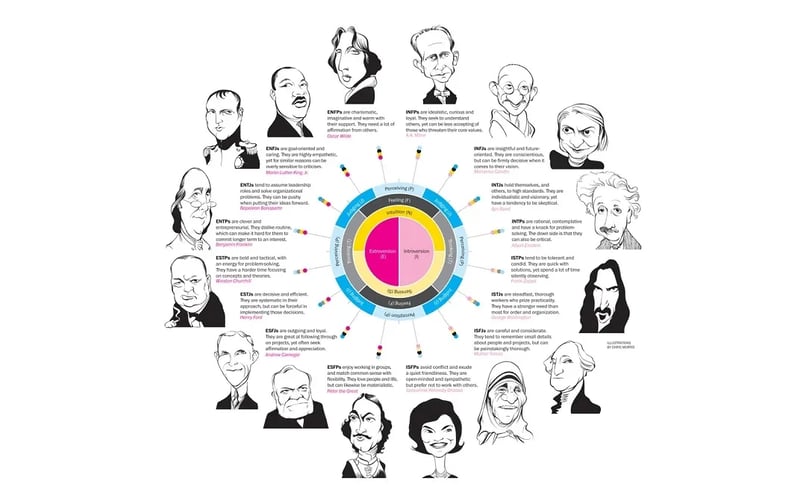
The 16 Personality Types & Their Characteristics According to Myers Briggs


The 16 Personality Types & Their Characteristics According to Myers-Briggs
The Myers-Briggs Indicator is one of the most popular personality tests today, largely due to the ambitious nature of its proposal.
Unlike other personality assessment tools that focus on specific aspects of our behavioral and thought patterns, the Myers-Briggs Indicator was designed to explore the most important and unique traits that describe an individual's way of being through 16 personality types.
This approach, often described as "holistic," is appealing to many who see this test as a way to uncover the essence of individuals, the core elements that define them in a comprehensive sense.
However, the Myers-Briggs Indicator has its critics, who question the validity and usefulness of the test and, consequently, the 16 personality types it proposes. Let’s delve into both the defense and the criticism of this personality classification system.
What is the Myers-Briggs Indicator?
The MBTI, as it’s known in English, is a personality test based on the works of Carl Gustav Jung and the personality types he proposed.
The Myers-Briggs Indicator borrows eight of the psychological functions Jung used to theorize about different personality types and incorporates a system of questions designed to study how people's preferences and ways of being align with these categories.
How Does the MBTI Work?
The Myers-Briggs Indicator uses four dichotomies, each with two extremes, to examine personality. These are:
Extraversion (E) or Introversion (I)
Intuition (N) or Sensing (S)
Thinking (T) or Feeling (F)
Judging (J) or Perceiving (P)
Participants answer questions reflecting on their way of being, thinking, and feeling, making this an introspection-based assessment tool. Using these responses, data is analyzed to determine which of the 16 personality types best describes an individual’s traits and preferences.
The 16 Myers Briggs Personality Types
From the combination of these eight variables across four dichotomies, the following 16 personality types emerge:
ESTJ (Extraverted Sensing Thinking Judging)
People who like to take control of their surroundings, ensuring everything functions as it should, often implementing solutions themselves when necessary.ESTP (Extraverted Sensing Thinking Perceiving)
Spontaneous, cheerful, and active individuals who often assert dominance through their observational skills and charisma.ESFJ (Extraverted Sensing Feeling Judging)
Highly attentive to others’ needs, especially those within their close circles. They value social stability and tend to avoid strong conflicts by being diplomatic.ESFP (Extraverted Sensing Feeling Perceiving)
Joyful and spontaneous, they love entertaining and being entertained. Their warmth and sociability make them fun-loving and focused on novelty and personal experiences.ISTJ (Introverted Sensing Thinking Judging)
Defined by their strong sense of duty and morality, they value order and logical systems while being introverted yet socially capable.ISTP (Introverted Sensing Thinking Perceiving)
Reserved and action-oriented problem solvers who value spontaneity, logic, and practical solutions in daily life.ISFJ (Introverted Sensing Feeling Judging)
Known for their reliability and desire to help, they aim to meet expectations without seeking personal rewards, often shying away from ambition.ISFP (Introverted Sensing Feeling Perceiving)
Focused on the here and now, they seek novelty and sensory stimulation. Artistic and warm, they thrive in creative pursuits.ENTJ (Extraverted Intuitive Thinking Judging)
Natural leaders with analytical minds and a knack for strategic planning. They are adaptable and persuasive communicators.ENTP (Extraverted Intuitive Thinking Perceiving)
Curiosity-driven individuals who thrive on intellectual challenges, often displaying competitive and innovative tendencies.ENFJ (Extraverted Intuitive Feeling Judging)
Teachers and guides who influence others positively by aligning their values with collective well-being.ENFP (Extraverted Intuitive Feeling Perceiving)
Highly creative and sociable individuals who often participate in collective projects aimed at societal improvement but may struggle with routine tasks.INTJ (Introverted Intuitive Thinking Judging)
Analytical problem-solvers who focus deeply on theories and self-confidence, often excelling in niche areas of expertise.INTP (Introverted Intuitive Thinking Perceiving)
Reflective and theory-driven individuals, prone to perfectionism and valuing accuracy over practicality.INFJ (Introverted Intuitive Feeling Judging)
Idealists driven by strong values and empathy, often balancing introspection and action to benefit others.INFP (Introverted Intuitive Feeling Perceiving)
Creative and sensitive individuals with artistic inclinations, focused on helping others while maintaining their reserved nature.
Criticism of the Myers Briggs Indicator
Many researchers and academics dispute the scientific validity of the MBTI, arguing that it relies on Carl Jung's ideas, which lack a foundation in the scientific method. Furthermore, critics believe the 16 personality types are too vague and abstract to predict behavior or thought patterns effectively.
This vagueness leads to the Forer Effect, where individuals identify with broad personality descriptions that could apply to anyone. This confirmation bias undermines the MBTI’s credibility as a predictive tool.
So… Is It Useful?
The Myers-Briggs Indicator’s ambiguity, similar to Jung’s original personality theory, limits its usefulness in psychological research. Models of personality should help isolate relevant psychological variables and have predictive value in certain contexts.
While the MBTI remains popular in organizational settings for hiring and promotions, it has faced significant criticism in research circles and is rarely used academically.
However, the MBTI can still be inspiring and encourage reflection on how personality traits interact. For personal growth, it provides insights into one’s character and relationships, even if its scientific utility is limited.
My Digital Clouds
"We Are the Art of Growth Marketing"
Digital Clouds LLC © 2024 | All Rights Reserved
LEGAL
CONTACT
Miami • Florida • USA
MENU
Home
Digital Clouds
Growth Solutions
The Blog





